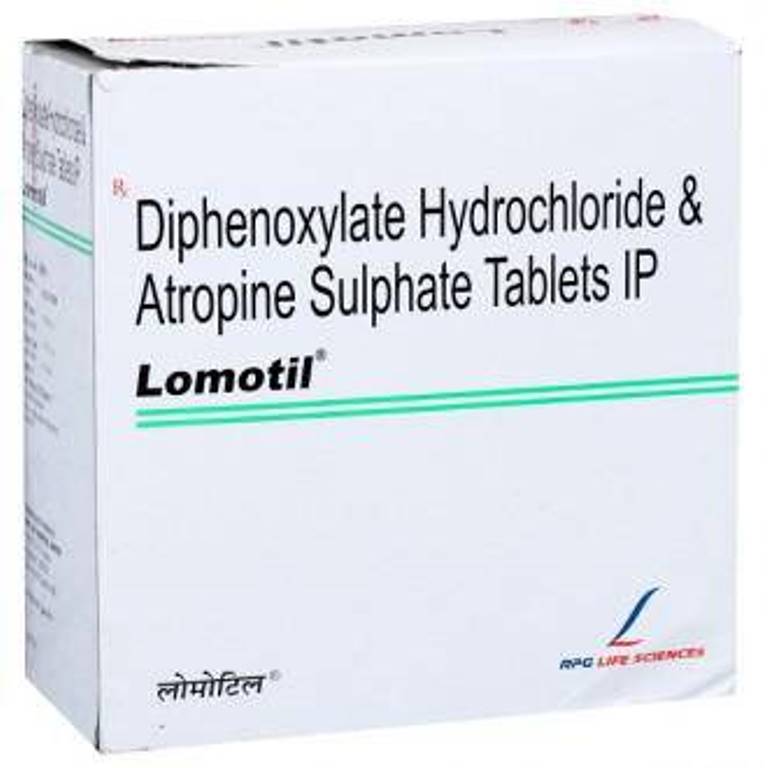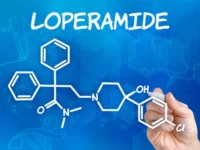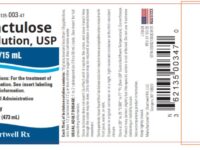Diphenoxylate, a medication primarily indicated for the treatment of diarrhea, belongs to the class of drugs known as antidiarrheals. Often combined with atropine to deter its misuse and abuse potential, diphenoxylate works by slowing down gastrointestinal motility, thus reducing the frequency of bowel movements and improving the absorption of water and electrolytes. Despite its efficacy in managing diarrhea, it’s imperative to comprehend its contraindications and safety considerations to ensure its judicious use and mitigate potential risks.
Delving into Diphenoxylate:
Diphenoxylate operates as an opioid agonist, primarily influencing the gastrointestinal tract to alleviate symptoms associated with diarrhea, including loose stools and abdominal discomfort. Generally prescribed for short-term use to address acute episodes of diarrhea, diphenoxylate is often combined with atropine, a medication that further discourages misuse by inducing unpleasant side effects if taken in excessive amounts.
Diphenoxylate Contraindications
1. Allergy or Hypersensitivity:
Individuals who have a documented allergy or hypersensitivity reaction to diphenoxylate, atropine, or any of the components present in the medication should exercise utmost caution and avoid its usage altogether. Allergic reactions to medications can manifest in various forms and degrees of severity, ranging from mild skin irritations, itching, or hives to more severe manifestations such as angioedema, respiratory distress, or anaphylaxis, a life-threatening emergency requiring immediate medical intervention.
Allergic reactions occur when the body’s immune system mistakenly identifies a particular substance, in this case, diphenoxylate or atropine, as harmful and mounts an immune response against it. This immune response triggers the release of histamines and other inflammatory mediators, resulting in the characteristic signs and symptoms of an allergic reaction.
For individuals with a known allergy to diphenoxylate or atropine, exposure to these substances can precipitate a rapid and severe allergic response, necessitating prompt medical attention. In such cases, healthcare providers may recommend alternative therapeutic agents devoid of the allergenic components or employ appropriate interventions to mitigate allergic reactions and manage their symptoms effectively.
Given the potentially life-threatening nature of allergic reactions, patients should diligently communicate any history of allergies or hypersensitivities to their healthcare providers before initiating treatment with diphenoxylate or any other medication. Healthcare providers, in turn, must meticulously review patients’ medical histories, including any documented allergies or adverse drug reactions, to make well-informed decisions regarding the selection and administration of medications, thereby minimizing the risk of allergic complications and optimizing patient safety and therapeutic outcomes.
2. Severe Liver Dysfunction:
Patients with severe liver dysfunction or hepatic impairment are advised against the use of diphenoxylate due to the heightened risk of exacerbating liver damage or toxicity. The liver plays a pivotal role in metabolizing drugs by breaking them down into inactive substances that can be eliminated from the body. However, in individuals with compromised liver function, this metabolic process may be impaired, leading to the accumulation of toxic byproducts or the parent drug itself, which can precipitate adverse effects and exacerbate pre-existing liver pathology.
Liver dysfunction can arise from various etiologies, including chronic liver diseases such as cirrhosis, hepatitis, liver cancer, or acute liver failure due to drug-induced hepatotoxicity or viral infections. Regardless of the underlying cause, compromised liver function compromises the organ’s ability to perform its vital functions, including drug metabolism, detoxification, and synthesis of essential proteins and enzymes.
In patients with severe liver dysfunction, the pharmacokinetics of diphenoxylate may be altered, leading to increased drug levels in the bloodstream and a prolonged duration of action. Consequently, these patients may be at a heightened risk of experiencing adverse effects such as sedation, respiratory depression, constipation, or hepatic encephalopathy, a serious complication of liver disease characterized by cognitive impairment, confusion, and altered consciousness.
Given the potential for adverse outcomes in patients with severe liver dysfunction, healthcare providers must exercise caution and prudence when prescribing medications such as diphenoxylate in this patient population. Alternative treatment modalities may need to be explored, or dosage adjustments and close monitoring protocols implemented to mitigate the risk of adverse effects and ensure patient safety.
Furthermore, patients with liver dysfunction should undergo regular monitoring of liver function tests and clinical assessments to evaluate disease progression, assess treatment efficacy, and detect early signs of drug-induced hepatotoxicity or liver decompensation. Healthcare providers should collaborate closely with hepatologists or specialists in liver disease management to optimize patient care and treatment outcomes while minimizing the risk of liver-related complications associated with medication use.
3. Infectious Diarrhea:
Diphenoxylate is not considered an appropriate treatment for diarrhea caused by infections such as bacterial or viral gastroenteritis. In cases of infectious diarrhea, the primary goal of treatment is to address the underlying cause, which typically involves targeting the infectious agent responsible for the gastrointestinal symptoms.
Bacterial gastroenteritis is commonly caused by pathogens such as Escherichia coli, Salmonella, Shigella, and Campylobacter, among others. Viral gastroenteritis, often referred to as the stomach flu, can be caused by viruses such as norovirus, rotavirus, or adenovirus. These infections typically result in symptoms such as diarrhea, abdominal cramps, nausea, vomiting, and fever.
Unlike non-infectious causes of diarrhea, which may benefit from the use of antidiarrheal medications like diphenoxylate, infectious diarrhea requires a different treatment approach. In many cases, the body’s immune system is capable of clearing the infection on its own, and treatment focuses on supportive measures to prevent dehydration and alleviate symptoms.
Antibiotics may be prescribed in cases of bacterial gastroenteritis if the infection is severe or persists for an extended period, and the causative organism is susceptible to antibiotic therapy. However, the indiscriminate use of antibiotics is discouraged, as it can contribute to antibiotic resistance and other adverse effects.
In the context of viral gastroenteritis, antibiotics are not effective, as viruses do not respond to antibacterial medications. Treatment primarily involves supportive care, including fluid and electrolyte replacement to prevent dehydration, as well as symptomatic relief for nausea, vomiting, and diarrhea.
Using diphenoxylate to manage infectious diarrhea is not recommended because it does not address the underlying cause of the symptoms and may delay the clearance of the infectious agent from the body. In some cases, it can even exacerbate the infection by slowing down bowel motility and prolonging the presence of the pathogen in the gastrointestinal tract.
Therefore, individuals experiencing diarrhea due to suspected or confirmed infectious causes should consult a healthcare professional for appropriate evaluation and management. This may involve diagnostic testing to identify the specific infectious agent and determine the most appropriate course of treatment, which may include supportive care, dietary modifications, and, in some cases, specific antiviral or antibiotic therapy.
By focusing on treating the underlying cause of infectious diarrhea and providing supportive care to manage symptoms, healthcare providers can help patients recover more quickly and minimize the risk of complications associated with gastrointestinal infections.
- Diarrhea Associated with Clostridium difficile Infection:
Diphenoxylate is contraindicated in diarrhea attributed to Clostridium difficile infection due to the potential for exacerbating the condition and precipitating complications. Management of C. difficile infection typically entails specific antibiotics targeting the causative bacteria.
- Respiratory Conditions
Individuals grappling with severe respiratory conditions such as asthma, chronic obstructive pulmonary disease (COPD), or respiratory depression are cautioned against diphenoxylate use owing to the risk of further respiratory suppression. Opioid medications possess the propensity to depress respiratory drive, particularly in individuals with pre-existing respiratory compromise.
Safety Considerations and Precautions:
- Pregnancy and Breastfeeding: The safety profile of diphenoxylate during pregnancy and lactation remains inadequately elucidated. Pregnant or lactating women should consult their healthcare provider to evaluate the potential risks and benefits associated with diphenoxylate use.
- Elderly Population: Older adults may exhibit heightened sensitivity to the effects of diphenoxylate, including sedation, dizziness, and constipation. Accordingly, administering lower doses or implementing close monitoring protocols becomes imperative to forestall adverse reactions in this demographic.
- Drug Interactions: Diphenoxylate has the propensity to interact with various medications, including central nervous system depressants, specific antibiotics, and anticholinergic agents. Patients must apprise their healthcare provider of all medications, supplements, and herbal products they are concurrently using to preclude potentially deleterious interactions.
- Substance Use Disorder: Individuals with a history of substance use disorder, particularly opioid dependence, should exercise caution when using diphenoxylate owing to its abuse potential and addictive properties. Vigilant supervision and monitoring by a healthcare professional are indispensable in such scenarios.
- Driving and Operating Machinery: Diphenoxylate may elicit adverse effects such as drowsiness, dizziness, or blurred vision, which can impair one’s ability to operate vehicles or machinery safely. Patients are urged to exercise caution when engaging in activities necessitating mental acuity until they discern how diphenoxylate affects them.
Read also: Loperamide Indications and Contraindications
While diphenoxylate emerges as a viable therapeutic option for diarrhea management, acquainting oneself with its contraindications and safety considerations assumes paramount significance. Patients ought to adhere meticulously to their healthcare provider’s directives regarding dosage, treatment duration, and pertinent precautions associated with diphenoxylate administration. By fostering a comprehensive understanding of the potential risks and benefits inherent in diphenoxylate usage, individuals can make well-informed decisions concerning their gastrointestinal health while mitigating the likelihood of adverse effects and complications. As with any pharmacological intervention, maintaining open lines of communication with healthcare professionals remains pivotal in fostering safe and efficacious treatment outcomes.







